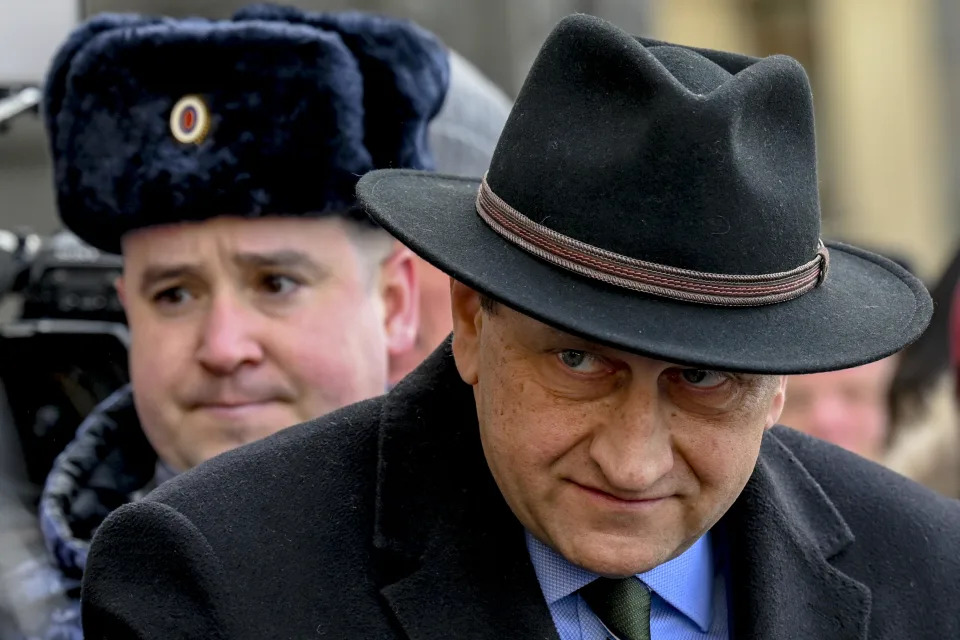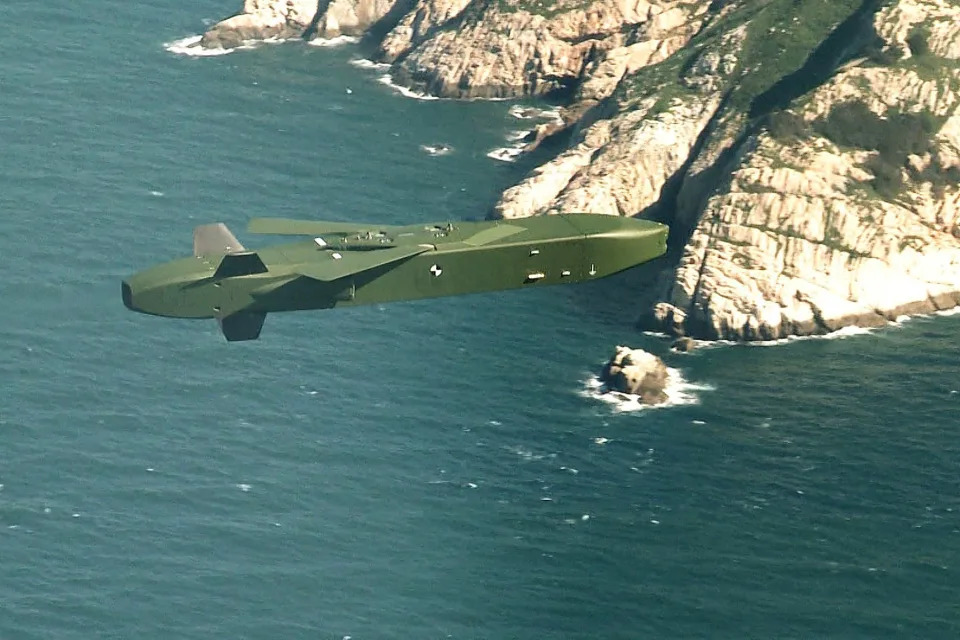The German government on Monday vehemently rejected allegations that Russia's leak of a conversation by high-ranking German military officers was an indication that Berlin was preparing for war against Russia.
At the same time, the government sought to contain the domestic fallout from the leak and promised a quick investigation into how a conversation by top German military personnel could be intercepted and published.
“It is absolutely clear that such claims that this conversation would prove, that Germany is preparing a war against Russia, that this is absurdly infamous Russian propaganda,” a spokesman for German Chancellor Olaf Scholz told reporters in Berlin.
Government spokesman Wolfgang Buechner said the leak was part of Russia’s “information war” against the West, and that the aim was to create discord within Germany.
The 38-minute recording features military officers discussing in German how Taurus long-range cruise missiles could be used by Kyiv against invading Russian forces.
While German authorities have not questioned the authenticity of the recording, Scholz said a week ago that delivering these weapons to Ukraine is not an option — and that he does not want Germany to be drawn into the war directly.
Russia’s foreign ministry, however, on Monday threatened Germany with “dire consequences” in connection with the leak. It did not elaborate.
“If nothing is done, and the German people do not stop this, then there will be dire consequences first and foremost for Germany itself," foreign ministry spokesperson Maria Zakharova said.
Relations between the two countries have continuously deteriorated since Russia invaded Ukraine two years ago.
The audio leak was posted by Margarita Simonyan, chief editor of Russian state-funded television channel RT, on social media on Friday, the same day that Russian opposition leader Alexei Navalny was laid to rest after his still-unexplained death two weeks ago in an Arctic penal colony. The recording also surfaced just weeks before Russia's presidential election.
In the leaked audio, four officers, including the head of Germany’s air force, Ingo Gerhartz, can be heard discussing deployment scenarios for Taurus missiles in Ukraine before a meeting with Defense Minister Boris Pistorius, German news agency dpa reported.
The officers then state that early delivery and rapid deployment of Taurus missiles would only be possible with the participation of German soldiers. The officers said training Ukrainian soldiers to deploy the Taurus on their own would be possible, but it would take months.
The recording also shows the German government has not given its OK for the delivery of the cruise missiles sought by Ukraine, dpa reported.
There has been a debate in Germany about whether to supply the missiles to Ukraine as Kyiv faces battlefield setbacks. With military aid from the United States held up in Congress. Germany is now the second-biggest supplier of military aid to Ukraine after the U.S., and it is further stepping up its support this year.
Scholz’s insistence last week on not giving Taurus missiles to Ukraine came after Germany stalled for months on the country's desire for the missiles, which have a range of up to 500 kilometers (310 miles) and could in theory be used against targets deep inside Russian territory.
On Monday, the chancellor reiterated his stance during a visit to a school in Sindelfingen in southwestern Germany.
“I'm the chancellor, and that's why it's valid,” he said regarding his “no” to the delivery of Taurus missiles, dpa reported.
Also on Monday, Germany's ambassador visited Russia's foreign ministry in Moscow. While Russia media reported that Ambassador Alexander Graf Lambsdorff had been summoned by the ministry, the German government said his visit was planned well before the audio was published.
Germany's defense ministry tried to downplay the significance of the leaked conversation, saying it was merely an “exchange of ideas” before a meeting with the defense minister.
The ministry said it was investigating how a conversation by top German military personnel could be intercepted and leaked by the Russians. It promised to report its findings. Several German media have reported that the officers were in a WebEx meeting when they were taped.
Buechner, the spokesman for the chancellor, said the German government would also look into how it “can better counter targeted disinformation, especially from Russia.”
In the United States, National Security Council spokesman John Kirby declined to address any specifics of the leaked audio, but he called the release “a transparent attempt by Russians to sow discord.”
The Kremlin on Monday said it looked forward to the results of the German government’s investigation.
“Mr. Scholz said that a fast, complete and effective investigation would be carried out. We hope that that we will be able to find out the outcome of that investigation,” spokesperson Dmitry Peskov said.
In London, a spokesman for U.K. Prime Minister Rishi Sunak warned that the government must “treat anything coming out of the Kremlin with caution,” noting the Russian government’s record of spreading misinformation.
“It is in their interests to sow disunity amongst allies who are seeking to support the armed forces of Ukraine," spokesman Dave Pares said. "We should not fall into that trap.”
Germany investigates Ukraine aid military recording leak in Russia
German authorities have launched an investigation after an audio recording of the country's military discussing aid to Ukraine was published in Russia.
In the 38-minute clip, officers discuss supplying Kyiv with long-range Taurus missiles - something repeatedly requested by Ukraine, but so far refused by Berlin.
On Saturday, German Chancellor Olaf Scholz called the leak - which is a source of embarrassment for the country's army - a “very serious matter."
He added that authorities were working to clarify the matter “very carefully, very intensively and very quickly.”
Since Russia invaded Ukraine in February 2022, Germany has debated whether to send the German-Swedish cruise missiles to Kyiv.
In January, Germany's Bundestag voted with a clear majority against the move, amid worries about the consequences if Ukraine used German weapons to attack Russia.

Some fear possible retaliation from Moscow if targets deep inside Russian territory are hit, potentially drawing Germany more directly into the war.
Others claim the missiles would provide a much-needed boost to Ukraine's war effort, which has currently stalled and is facing renewed Russian advances.
In the leaked recording, military officers discuss how the Taurus missiles could be used by Ukraine.
Germany’s Ministry of Defense said it was investigating whether communications within the air force were intercepted by Russia.
In a statement carried by the German Press Agency DPA, it said: “According to our assessment, a conversation within the Air Force was intercepted. We cannot currently say with certainty whether changes have been made to the recorded or written version that is circulating on social media."
Margarita Simonyan, chief editor of Russian state-funded TV channel RT, posted the audio on social media.
“In this... recording, high-ranking Bundeswehr officers discuss how they will bomb (attention!) the Crimean bridge,” she wrote on the Telegram.
Within the conversation, one officer mentioned a planned trip to Ukraine to coordinate strikes on Russian targets, she claimed.
Germany is now the second-biggest supplier of military aid to Ukraine after the United States, where efforts to supply more assistance have been bogged down in Congress.
Berlin is expected to step up support this year.
Scholz has stalled for months on Ukraine’s request for Taurus missiles, which have a range of up to 500 kilometres.
The chancellor has long emphasised his determination to help Ukraine without drawing the NATO member into the war, stressing that no German soldiers will go to Ukraine.
“We will not send European soldiers to Ukraine. We don’t want a war between Russia and NATO. And we will do all we can to prevent it,” Scholz told a meeting of the Party of European Socialists in Rome on Saturday.
On Monday, French President Emmanuel Macron said the future deployment of Western troops on the ground in Ukraine was not “ruled out."
Germany, Poland and other allied countries quickly distanced themselves from his suggestion.
Germany accuses Russia of a "hybrid attack" for leaking call on Ukraine
The Kremlin said Monday that a leaked audio recording broadcast over the weekend by Russian media, of a meeting between high-ranking German military officers discussing the hypothetical provision of long-range missiles to Ukraine, showed "the direct involvement of the collective West" in the Ukraine war. Germany's government has been thrown into convulsions by the embarrassing leak of the detailed, top-level military discussion. It called the leak a Russian "hybrid attack" aimed at destabilizing the European country.
A Russian state broadcaster published the 38-minute recording of a conversation between four German army officers about how Ukraine's military might use Taurus cruise missiles if Germany were to provide the weapons.
Although no shipment of the missiles has been approved, the recording broadcast on Friday afternoon revealed detailed discussions among German officials about what Ukraine could do with the weapon system if it were delivered. Specific targets, including ammunition depots and strategic bridges, were discussed.
"The recording itself says that within the Bundeswehr [German military], plans to launch strikes on Russian territory are being discussed substantively and concretely," Kremlin spokesman Dmitry Peskov told reporters Monday, misrepresenting the discussion.
Russia's Foreign Ministry summoned Germany's ambassador in Moscow for a dressing down over the conversation.

Another topic of the conversation, which took place last month, according to Russia, was whether Ukrainian forces could use the Taurus missiles without hands-on help from German personnel, and how long it might take to train Ukrainian troops to do it themselves.
The Ukrainian government requested the delivery of Taurus missiles in May 2023, saying it needed the long-range weapons to enable it to target Russian supply lines in occupied territory behind the front lines. The missiles would give Kyiv the ability to attack much deeper inside Russia, however, even to reach Moscow, and in October, German Chancellor Olaf Scholz decided not to send the weapons to Ukraine.
Over the past few days, Scholz has reiterated his concern that providing them could risk Germany becoming directly involved in the war with Russia.
The intercepted conversation shows that a rapid deployment of the complex weapon system would only be possible with the direct participation of German soldiers. The German officers noted that Ukraine could eventually train its soldiers and deploy the missiles unilaterally, but that would require more time.

"German soldiers must not be linked to the goals that this system achieves at any point and in any place," Scholz said last week, noting that any public deployment of German troops to help operate the Taurus missiles could be deemed by Russia as active participation in the war.
Some members of Scholz's government, as well as opposition politicians, are in favor of Germany delivering Taurus missiles to Ukraine quickly, and he was already coming under criticism for his reluctance before the audio leak.
This ordeal has brought even more intense scrutiny on Scholz, raising questions about his repeated insistence that German soldiers would be needed to operate Taurus missiles in Ukraine, when the officers on the call made it clear that would not necessarily be the case.
Germany's Military Counter-Intelligence Service immediately launched an investigation into the leak of the audio, and at a hastily called news conference on Sunday afternoon, Defense Minister Boris Pistorius called it "a hybrid attack" by Russia.
Pistorius called it "disinformation" and said it was "about division — it's about undermining our unity."
The German Air Force officers involved in the conversation appeared to have been relatively careless in conducting the conference call. The virtual meeting did not take place on a secure line, but via the WebEx platform, which is known to be relatively easy to intercept. An encrypted line should have been used for the discussion of confidential military matters, per Bundeswehr regulations.




